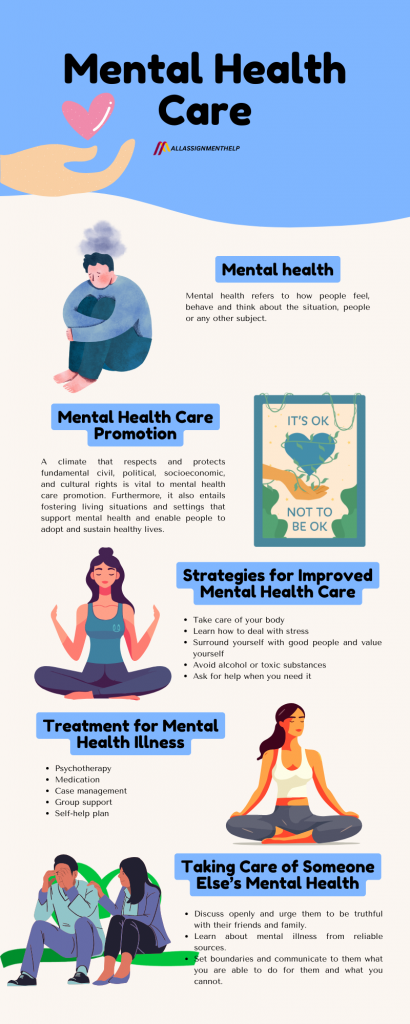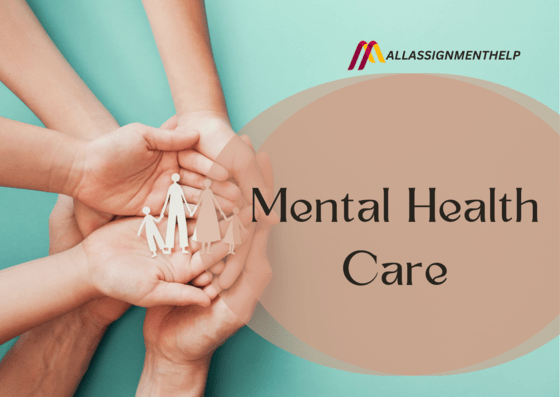One thing that all people have in common is the need to take care of our minds. Whether you are dealing with serious mental health issues or just attempting to keep your health in check in an unpredictable and confusing world, everyone may benefit from appropriate mental health care practices. Moreover, the mental health sector is intricate and multifaceted, particularly when considering healthcare. It might be challenging to navigate and figure out where to go for what at times. However, it is crucial to locate easily available resources to complement your mental health treatment plan. Positive things happen when we look after our mental health. Furthermore, our findings on mental fitness and mental wellness are self-explanatory. Read this blog curated by the experts at All Assignment Help to know more about mental health care.
What is Mental Health?
Mental health refers to how people feel, behave and think about the situation, people or any other subject. In fact, your mental health can affect your relationships, your daily beings and most importantly your physical health. However, looking after mental health can boost your daily life in a positive manner and you can enjoy your life better. Moreover, there are several mental health care practices that you can use to treat your mental health. For example; psychotherapy, medication, self-help etc.
World Health Organization says that mental health is more than just the absence of mental disabilities or mental disorders. Above all, your mental health is not only important for active conditioning but also for ongoing wellness and happiness.
Also read: Understand the Popular Stereotypes of Humans with Developmental Psychology
Mental Health Care: Why it’s Important
In order to avoid risk factors that could contribute to the development of a mental disorder and to promote mental health care, protective factors and healthy behaviours that can help delay the start of a diagnosable mental illness are encouraged. Moreover, a climate that respects and protects fundamental civil, political, socioeconomic, and cultural rights is vital to mental health care promotion. Furthermore, it also entails fostering living situations and settings that support mental health and enable people to adopt and sustain healthy lives. Maintaining a high degree of mental health is extremely difficult without the safety and independence that these rights afford.
Being a student, you are at risk of mental disorders due to excessive academic pressure. Moreover, if you are an online student then the hustle to juggle between academic and social life is real. Continuous classes, tests, assignments, etc. contribute a lot to the poor mental health of students. As a result, they often have thoughts like can I pay someone to take my online class? Lowering the academic pressure, a little would give students space to take care of their mental health. Therefore, several websites are available online from where you can hire professional experts to take your classes on your behalf so that you can get some time free to focus on yourself. Try meditation, good sleep, and a healthy diet to keep your mental state in a good space.
Mental Health Issues in Adults
According to UNICEF, 13% of individuals globally between the ages of 10 and 19 have a diagnosed mental health issue. Moreover, this groundbreaking study addresses the potential and difficulties associated with treating and preventing mental health issues in youth. It becomes clear how intricate, under-researched, and underfunded teenage mental health is. Furthermore, the mental health issues that affect young people, anxiety and depression account for about 40%. Also, according to UNICEF, among teenagers (ages 15 to 19), suicide ranks as the fourth most common cause of death globally, behind TB, traffic accidents, and interpersonal violence. Suicide is the second-leading cause of mortality for young people in that age group in Western Europe and Central Asia, and the top cause in Eastern Europe and Central Asia.
Only one-third of funding for mental health care research is directed towards youth, despite the fact that the majority of mental health illnesses develop during adolescence, according to UNICEF. This implies that there is a dearth of knowledge about what is effective when it is effective, and why, and that there are few effective techniques of prevention and therapy. Additionally, if academic pressure is the reason why you are stressed mentally, try seeking professional assistance through an online coursework service.
Some Common Mental Health Disorders
Let us read about some of the very common mental health disorders that affect every 1 out of 5 people.
Bipolar disorder
It is a chronic mental illness. It can affect a person’s energy level. And the ability to think reasonably. Additionally, they cause severe mood swings. Mood swings experienced by people are more harmful than small ups and downs.
Persistent depressive disorder
This is a chronic type of depression. It is also called dysthymia. It can interfere with a person’s daily life. In this condition, people experience at least two years of symptoms.
Generalized anxiety disorder
GAD is different from normal anxiety. In this, a person becomes extremely worried about different things. Even there is no reason to worry.
Major depressive disorder
MDD causes feelings of extreme sadness or hopelessness. The symptoms can last up to two weeks. It is also known as clinical depression. People with MDD become so upset in their lives that they think of ending with suicide.
Obsessive-compulsive disorder
OCD causes constant and repetitive thoughts of obsession. These thoughts are unreasonable and have the desire to carry out certain behaviours or compulsions. People realize that their thoughts are uncertain yet they cannot stop them.
Post-traumatic stress disorder
PTSD is a mental illness that comes after experiencing a traumatic event. Experiences can range from extreme events any verbal or physical abuse.
Schizophrenia
It impairs a person’s perceptions of reality and the world around them. The person might experience hallucinations, have delusions and might hear voices. They can put themselves in dangerous situations if not treated.
Social anxiety disorder
It is also called social phobia which can cause extreme fear of social situations. People with social anxiety may become very nervous when they are around other people. This makes it hard for them to meet new people.
Also read: Western University of Health Sciences- Important Information!
Strategies for Improved Mental Health Care
Given below are some ways to take care of your mental health.
Take care of your body
Taking care of your physical health can improve your mental health. Eat a nutritious meal, drink plenty of water and have proper exercise. Try to avoid smoking and vaping and get enough sleep.
Learn how to deal with stress
Stress is part of our life. Try to practice good coping skills. You can try different stress strategies. Laughter can boost your immune system. Try to relax your body and reduce stress. Moreover, in case of academic stress, seeking online assignment help to relieve some of the pressure of excessive homework and learning.
Surround yourself with good people and value yourself
Make outing plans with supportive family members and friends. Look after activities where you can meet new people. Start treating yourself with kindness and respect. Make time for your hobbies and start valuing yourself.
Avoid alcohol or toxic substances
Try to avoid alcohol as much as you can. Do not use these items as self-medication.
Ask for help when you need it
Seeking help is always a sign of strength. Ask for help and get yourself treated. There are various methods and treatments available for your coping. Help yourself and others cope with mental illness. Remember it’s not a disease you can easily win over.

Treatment for Mental Health Illness
Different people diagnosed with mental health cope by participating in individual or group treatment. There is no common treatment that works for everyone. You can choose an individual treatment or group of treatments that may work best for you. Below are the following treatments that are commonly used for mental health care.
Psychotherapy
It is a therapeutic treatment, provided by a trained mental health professional. Through this treatment, individuals explore their thoughts, feelings and behaviours that help in implementing their well-being—for example, cognitive behavioural therapy, dialectical behavioural therapy etc.
Medication
It helps with the management of symptoms. Medication with psychotherapy is the most effective way to recover.
Case management
It helps in co-ordinate services for an individual. With the help of a case manager. A case manager can help you to assess, plan and implement a number of strategies.
Group support
It is a group meeting in which members guide each other towards a shared goal of recovery. It comprises non-professionals who have experienced similar situations.
Self-help plan
It is the best and most unique plan where an individual addresses his or her conditions by implementing strategies that promote wellness.
Taking Care of Someone Else’s Mental Health
To provide the individual you are taking care of the best support possible, try to do the following:
- Discuss openly and urge them to be truthful with their friends and family.
- Learn about mental illness from reliable sources, including books written by experts or websites run by the government or health organizations.
- Set boundaries and communicate to them what you are able to do for them and what you cannot, and urge them to have an active part in their mental health recovery, go out and interact with people, and lead a healthy lifestyle.
- Find out about any training programs for mental health care that are offered locally or online.
- Suggest them some good online assignment help US services if their mental health is affected by excessive academic pressure.
- Attend a mental health support group to connect with others going through a similar experience.
- When someone discusses suicide or self-harm, take it seriously and consult a mental health professional as soon as you can.
- Make backup arrangements in case you have to travel, go on vacation, or are otherwise unable to provide for them.
Conclusion
One’s mental health and general well-being are influenced by numerous things. Although social, environmental, and socioeconomic factors also play a significant role, they can either improve or deteriorate mental health. Moreover, if you are having problems, it is critical that you get assistance. Furthermore, in case you require assistance with enhancing your mental well-being or dealing with a psychological issue, consult a physician or mental health specialist.
Frequently Asked Questions
| Question: 1 What is mental health care? Answer: 1 These are the services targeted at improving mental health in those with mental disorders or issues and treating mental illnesses. |
| Question: 2 How can we handle mental health issues? Answer: 2 In order to take care of your mental health, exercise on a regular basis, maintain hydration and eat regular, prioritize getting enough sleep, decide on priorities and goals and pay attention to the good. |
